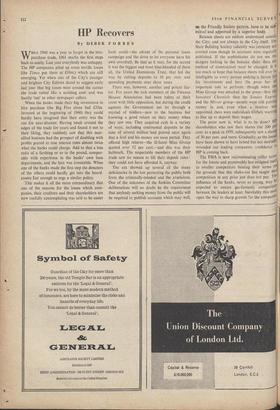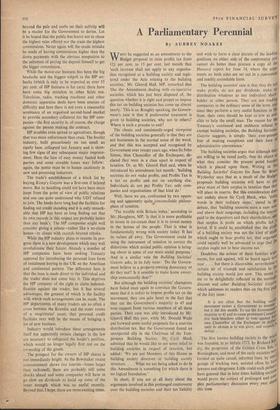HP Recovers
By DEREK FORBES
WHILE 1960 was a year to forget in the hire- purchase trade, 1961 marks the first steps back to sanity. Last year everybody was unhappy. The HP companies piled up some terrific losses (the Times put them at £10m.) which are still emerging. Yet when one of the City's younger and brighter City Editors dared to suggest early last year that big losses were around the corner the trade tutted like a scolding aunt and was hastily `out' to other newspaper callers.
When the banks made their big investment in hire purchase (the Big Five alone had £35m. invested at the beginning of 1960) they could hardly have imagined that their entry was the cue for near-disaster. Having smelt around the edges of the trade for years and found it not to their liking, they suddenly saw that this near- allied business had the prospect of doubling with profits geared to true interest rates almost twice what the banks could charge. Add to that a loss ratio of a farthing or so in the pound, compar- able with experience in the banks' own loan departments, and the lure was irresistible. When one of the banks made the first step the directors of the others could hardly get into the 'board- rooms fast enough to urge a similar policy.
This makes it all the more extraordinary that one of the reasons for the losses which com- panies, their creditors and their shareholders are now ruefully contemplating was said to be easier bank credit—the advent of the personal loans campaign and the drive to let everyone have his own overdraft. Be that as it may, for the record it was the biggest and most blue-blooded of them all, the United Dominions Trust, that led the way by cutting deposits to 10 per cent. and spreading payments over three years There was, however, another and potent fac- tor. For years the rich members of the Finance Houses Association had been rulers of their roost with little opposition, but during the credit squeeze the Government net let through a myriad of tiddlers—new to the business but knowing a good return on their money when they saw one. They acquired cash in a variety of ways, including continental deposits to the tune of several million and proved once again that a fool and his money are soon parted. They offered high returns—the ill-fated Mias Group quoted over 12 per cent.—and this was their hallmark. The respectable members of the HP trade saw no reason to lift their deposit rates: they could not have afforded it, anyway.
The era showed up several of the many deficiencies in the law protecting the public both from the criminally-minded and the avaricious. One of the outcomes of the Jenkins Committee deliberations will no doubt be the requirement that anybody seeking money from the public will be,required to publish accounts which may well, on the Friendly Society pattern, have to be sub' mined and approved by a superior body.
Balance sheets are seldom understood outside the City; and not always in the City itself. The State Building Society calamity was certainly not averted even though its accounts were regularlY published. if the sophisticates do not see the dangers lurking in the balance sheet, then the method of construction must be changed. It IS too much to hope that balance sheets will evci he intelligible to every person seeking a haven (0 his investments and here the press ha a important role to perform; though when th Mias Group was attacked in the press-7-first tb Investors' Chronicle then the Sunday Exptes and the Mirror group—people were still putting money in and, even when a receiver v85 appointed, there were individuals blithely wantinS to line up to deposit their wages. The point now is, what is to be donc? HP shareholders who saw their shares rise 200 pet cent, to a peak in 1959, subsequently saw a slurnP of 30 per cent. and more. Gradually, as the losses have been shown to have lamed but not mortallY wounded our leading companies, confidence le HP is coming back.
The FHA is now recommending stiffer terill5, for the future and presumably has resigned itself to smaller competitors beating their terms on the grounds that this shake-out has taught that competition at any price just does not pay. The influence of the banks, never so strong, may be expected to ensure gedlemanly competitioe between the leaders at least. Inevitably this ml-15t open the way to sharp growth for the companle' beyond the pale and curbs on their activity will be a matter for the Government to devise. Let it be hoped that the public has learnt not to chase the highest rates offered nor the trade the highest commissions. Never again will the crude mistake be made of having commissions higher than the down payments with the obvious temptation to the salesman of paying the deposit himself to get the bigger commission.
While the motor-car business has been the big headache and the biggest culprit in the HP set- backs (which is only to be expected as over 55 per cent. of HP business is for cars), there have been some big mistakes in other fields too. Television, radio, washing machines and other domestic apparatus deals have been sources of difficulty and here there is not even a reasonable semblance of an organised second-hand market to provide secondary collateral for the HP com- panies—the first security is, of course, the charge against the person making the contract.
HP troubles even spread to agriculture, though that was more unfortunate than crass. The broiler industry, built precariously on too small an equity base, collapsed last January and is show- ing few signs of any subsequent major improve- ment. Here the lure of easy money fooled both parties and some sizeable losses may follow: again, the motto must be to hasten cautiously in new and promising industries.
The trade's establishment of a black list by buying Kemp's Gazette was a first-rate if belated move. But its handling could not have been more inept from the point of view of public relations and one can quite understand why UDT refused to join. The banks have long had the facilities for finding out credit standing and it is only remark- able that HP has been so long finding out that its own records in this respect are probably better than any bank's. The HP companies might well consider giving a rebate—rather like a no-claim bonus—to clients with records beyond rebuke.
While the HP industry plans to resume its pro- gress there is .a new development which may well revolutionise their future. Already a number of HP companies have been seeking Treasury approval for introducing the personal loan form of instalment buying in the UK on the American and continental pattern. The- difference here is that the loan is made direct to the individual and the trader does not come into it. This deprives the HP company of the right to claim indemni- fication against the trader, but it has several advantages, the greatest of which is the facility with which such arrangements can be made. The HP departments of many traders are so often a cross between the Kremlin and the outer rooms of a magistrates' court, that personal credit facilities may well be the means of bringing a lot of new business.
Industry would iniroduce these arrangements itself but apparently certain changes in the law are necessary to safeguard the lender's position, which would no longer legally first rest on the ownership of the goods.
The prospect for the owners of HP shares is not immediately bright. As the Bowmaker recent announcement shows (no interim—losses larger than reckoned), there are probably still some shocks ahead and some companies will have to go slow on dividends to build up some of the inner strength which was so useful recently. Beyond that, I hope, there are more exciting times.



















































 Previous page
Previous page